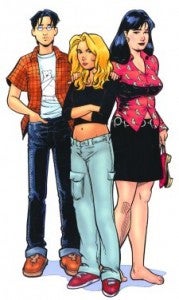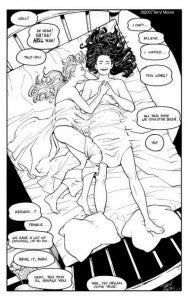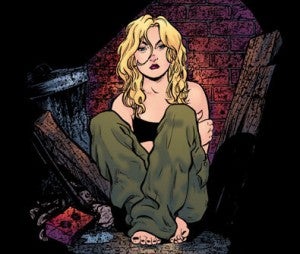You guys, I'd like to talk about an image that's been circulating around the geekier parts of the Internet this week: an image portraying several real-but-scantily-clad women as being inappropriate role models for girls by contrasting them with several female science fiction characters who were dressed in what I will refer to as "practical" clothing. Yeah, you know the one I'm talking about (but if not, look right and ignore everything after "ray-gun").
On the top line, we have Snooki, Bella Swann from Twilight (or depending on how you look at it, Kristin Stewart, who plays Bella), I-can't-be-bothered-to-figure-out-which-Kardashian-it-is, Kat von D, and Lady Gaga. All of them (with perhaps the exception of the Stewart and Snooki images) are depicted in revealing clothing. I honestly never thought I would observe that Snooki looked classier than someone, but there you have it. Because these women are dressed scantily (for larger or smaller values of scantily), the image presumes they have no inherent value.
Never mind that Kristin Stewart herself is outspoken, intelligent, actually HATES Twilight, and calls people out in interviews for using the word bitch. Never mind that Kat von D is famous not because she occasionally chooses to show off her gorgeous body, but because she is incredibly talented in a field that is traditionally considered to be male-dominated (she is a tattoo artist, best known for her work on the series LA Ink). While nobody is arguing that Gaga has interesting ideas about fashion, she has been an outspoken supporter of the LGBT community and of condom usage among sexually active people. You will notice that I have not listed a single thing in this paragraph that makes ANY of the women in this image a bad role model.
I have to grant you that in the cases of Snooki and whichever-Kardashian-that-is, I wouldn't consider either of them a role model. But you have to give them some credit, since they got famous by doing less work than your average technical support manager and have managed to make rather a lot of money doing so. Regardless, the image implies that these women are less worthy because they choose to dress in a sexy and/or revealing manner, something I take issue with.
Furthermore, you can look at the very same series as are portrayed in the middle row and come up with some terrible examples of progressive female character portrayal. Princess Leia, leader of the Rebel movement, queen of an entire planet, and twin of JESUS H. SKYWALKER, is presented here in her iconic slave costume. Because, you know, even a Queen is still a sex object first.
Now, I'm not going to bother addressing that bottom row of pictures up there individually, but we can see that in the geek cultural world there is still plenty of encouragement to objectify women. And that's the point, really, that I've been trying to get at with this entire rant. This image portrays geek culture as being superior because of the presence of non-scantily-clad female role models, but to me this says that women who choose to perform their gender and appearance in ways that people consider "sexy" are worthless. This image isn't about geeks being progressive, it's about slut shaming real women just because they choose to be sexy.
I've already ranted plenty of times about the sexualization of women in
fiction, particularly comics, so I'll leave that thought be, but there
is an important distinction to make as to why it's okay for real women to choose to be sexualized and why it's not okay for men to sexualize and objectify women the way they do in fiction, particularly geek fiction. The women on the top line of the image at the top of this post are celebrating their sexual agency and expressing themselves freely and not at all inappropriately (seeing as all of the fun parts are covered, and Stewart and Snooki are both wearing clothes I wouldn't be ashamed to wear to work). The women on the other two lines are depictions of (largely) men's ideas on how women should perform their sexuality.
I would be proud to list Gaga and Kat von D among my role models. I may
not like Bella Swann, but neither does Kristin Stewart. And if anyone
would like to pay me tens of thousands of dollars an episode to binge
drink and tan myself leathery, I am so there. Call me. In the
meantime, I propose that instead we celebrate people for having the
confidence and bravery to dress however the fuck they like, even if that
means bringing an entire new definition to the phrase "skirt steak."
Tuesday, June 19, 2012
Saturday, June 16, 2012
My Thoughts Watching Star Trek: The Motion Picture
Where One Man Has Never Gone Before:
My Thoughts Watching the Entire Star Trek Series For The First Time
Part One
I don't know a lot about Star Trek.
It wasn't anything personal as a result
of being a tremendous Star Wars fan; I just didn't have much
access to Star Trek. I saw a handful of episodes of the original
series in syndication, and had numerous viewings of Star Trek IV: The
Voyage Home on cable, when that was a thing you could catch on cable
several times a year, in between showings of Father of the Bride.
I was a teenager when I saw The Wrath
of Khan; I saw the J. J. Abrams reboot when it came out; and I saw
The Search for Spock when I bought a DVD collection because it was
cheaper than buying II and IV separately. All the rest, though, is
essentially a total mystery to me. And so I decided to watch every
Star Trek movie, in order.
Wednesday, June 6, 2012
Strangers in Paradise OR How I Learned to Stop Worrying and Love Katchoo
Russ Burlingame
Senior Staff Writer, ComicBook.com
For those of you who complain when reporters or bloggers talk about personal experience in a piece, I apologize up front. But read on, as I don't think the fact that it comes from a personal perspective changes the overall message.
I'm a child of the media, you have to understand.

I mean, not literally. Actually, I'm the child of a couple of center-right, workaholic parents. But the result of that is that often, the clearest and most concise advice I got on a lot of issues was through books, movies, music and TV.
And comics.
My views on race relations, for example, were irrevocably changed by an interview I did for my high school newspaper with Rubin "Hurricane" Carter, the middleweight boxer arrested in New Jersey in 1967 and convicted of a triple-murder he did not commit.
Carter spent 18 years in prison before the U.S. Supreme Court overturned his guilty verdict, saying that he had been convicted as a result of a case that rested on "racism rather than reason" and "concealment rather than disclosure." Try being a blissfully-ignorant, middle-class white teenager who thinks everything's been just peachy for thirty years, and then talking to a guy like that for an hour.
In the wake of the silly little tempest in a teapot that has been the discussion on homosexuality in comics over the last few weeks, I got to thinking about how I went from being a right-wing Christian who argued, and honestly believed, that all "the gays" were going to Hell, to being someone who actively and aggressively argues against that rather silly and embarrassing worldview.
The answer, when I came to one, was three words long: Strangers in Paradise.
Terry Moore's Strangers in Paradise is one of the great works in American sequential art; over the course of many years, Moore gave us three beloved characters--David Qin, Francine Peters and Katina Choovanski--who were more fully fleshed-out than most people I knew in real life. It was easy to really, truly care about these characters, their trials and hopes--and I did.
At the time, I was active in the Church of Christ, and I remember having these long, embarrassing-in-hindsight debates about gay people and how they just haven't tried hard enough to be straight. I was the kind of person that I now want to spray with a fire hose, and I was doing it all "on God's behalf." I was never mean about it (I don't think), just determined, but I'm still incredibly ashamed of the way I talked to people all those years ago, and I thank my good friend Logan Bretschneider for spending literally hours on the phone trying to help me get my head screwed on right.
Luckily for me, I stumbled across Strangers in Paradise when I was in college; I interned at Wizard Magazine and a guy named Andy down the hall was a huge supporter of the series. He convinced me to give it a try and I was almost immediately hooked.
I loved David Qin, who was a great point-of-view character for me. Not only was he the series' only male lead, and a bit of a bewildered one at that, which is a good way to be when you're relating to newcomers who join the series forty issues in or so--but he was a devout Christian in the way that Ned Flanders used to be, back before it took over every aspect of his personality. David was just a nice, quiet guy who believed and let it guide him, but who didn't need to talk about it everytime his mouth was open, and as a Christian I appreciated that.
David was also in love with Katina (Katchoo for short) who was, in turn, in love with Francine. The three of them all spent a lot of time together and occasionally lived together throughout the series, but the bottom line was, they all loved each other very much, all in different ways, but David wanted to be with Katchoo forever, and Katchoo wanted that from Francine--who was raised a :good Christian girl" who doesn't kiss other girls (and anyway wanted kids), and so had a lot of problems coming to grips with her sexuality and the fairly obvious fact that what she really wanted and needed was Katchoo.
And these imminently likable characters that Moore created, along with his clever writing and heartfelt ear for dialogue, changed something very fundamental about the way I perceived homosexuality. When you love someone, it changes your perspective on the issues that directly impact that person and, as crazy as it sounds, at age 21 or so I really loved David, Francine and Katchoo.
 I remember distinctly the day that I stopped being bothered that Katchoo--a character I liked and admired for a number of in-story reasons--was in love with another woman and started rooting for Francine to come around. It really was just like a switch went off and I realized that I'd been reading the comic all wrong up til then.
I remember distinctly the day that I stopped being bothered that Katchoo--a character I liked and admired for a number of in-story reasons--was in love with another woman and started rooting for Francine to come around. It really was just like a switch went off and I realized that I'd been reading the comic all wrong up til then.
For a long while, my own hangups made that impossible for me to say, and I kept hoping that she would end up with the lovable David (whose status as "great guy" never changed as my own views evolved, largely because David was not a judgmental prick). I justified my thinking to myself first that it was what God would want and then that David was a nice guy and deserved a good life, but ultimately it was about being uncomfortable around homosexuality, something I'd never encountered in life and only knew anything about from what they told us in church and at the Christian summer camp where I would spend the summers until I was 19.
Luckily, I grew up, and I have my (now) friend Terry Moore to thank for that in no small part.
Would I eventually have become a better, more tolerant person without Strangers in Paradise? Probably. The way I used to behave and perceive the world ran contrary to my personal instincts and moral compass even back then, and I've long past grown out of the stage where I'm willing to let "church folk", even the ones I love dearly, tell me how I should think. But it would have been a process and it's unlikely that it would have happened so quickly or that I would have been so immediately self-aware in terms of the preposterous way I was behaving.
So for all of you out there who are dragging out the old "These things have no place in comics--comics should be about escapism and real-world issues don't belong" argument, just remember this: Terry Moore never once did a "political" story about Katina being a lesbian...
(...well, I mean, there was that thing she did with the Senator, but that's a whole other thing...)
...Moore managed to make Katchoo and Francine characters who mattered to the readers--even the ones who went in with their own baggage--and that in doing so he helped at least one person not only to overcome his own prejudices, but hopefully to become a more decent human being to those around him.
If turning (one of a dozen) Green Lantern(s) gay can help even one gay young reader to become more comfortable in his own skin, I'm all for it. And even if it can't, if it can make one emotionally-stunted college guy realize that gay people are, well, people--I'm all for that, too.
And, failing that, if James Robinson can make Alan Scott a compelling character with an interesting personality and a heroic nature...well, then who cares what he does in his time off?
Subscribe to:
Posts (Atom)



